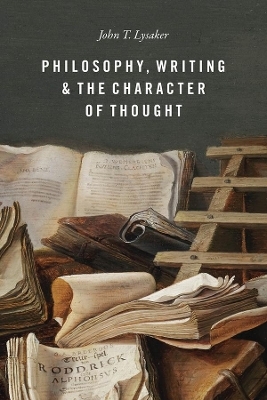
Philosophy, Writing, and the Character of Thought
University of Chicago Press (Verlag)
978-0-226-81585-5 (ISBN)
Considering each of the ways in which writing influences philosophy, Lysaker explores genres like the aphorism, dialogue, and essay, as well as logical-rhetorical operations like the example, irony, and quotation. At the same time, he shows us the effects of these rhetorical devices through his own literary experimentation. In dialogue with such authors as Benjamin, Cavell, Emerson, and Lukács, he aims to revitalize philosophical writing, arguing that philosophy cannot fulfill its intellectual and cultural promise if it keeps to professional articles and academic prose. Instead, philosophy must embrace writing as an essential, creative activity, and deliberately reform how it approaches its subject matter, readership, and the evolving social practices of reading and reflection.
John T. Lysaker is the William R. Kenan Professor of Philosophy at Emory University. He is the author of many books, including After Emerson and You Must Change Your Life: Poetry, Philosophy, and the Birth of Sense.
Gambits and Gambles
Iron Filings
Pardon the Interruption
Content and Form
Form and Content
In the Beginning Was the Deed
Reworking Making
Deliberate Writing
Mistaking Instrumental Reason
Fits and Starts
A Cultivar
Quotation beyond Quotas
For Examples
In Nuce
Irony
Message in a Bottle
The Hour of the Wolf
It’s the Gesture That Counts
Furnishing the Space of Reasons
A Struggle with Ourselves
Who’s on First
Every One Is Everybody
The Secret Addressee
When We Undo Things with Words
Unknown Friends
Resoundingly Reticent
Provocation/Demonstration
Among the Pros (and Cons)
A: “O my friend, there are no friends.” B: “At least we’ve got each other.”
Then Came History
Equal to the Moment
Unequal to the Moment
After Beauvoir
Property Is Theft
Strange Alchemy
Public Commitment
Propagation without Propaganda
Bit by Bit
Taking Stances
Character Studies
Where Do We Find Ourselves
Acknowledgments
Notes
References
Index
| Erscheinungsdatum | 01.09.2021 |
|---|---|
| Sprache | englisch |
| Maße | 152 x 229 mm |
| Themenwelt | Geisteswissenschaften ► Philosophie |
| ISBN-10 | 0-226-81585-4 / 0226815854 |
| ISBN-13 | 978-0-226-81585-5 / 9780226815855 |
| Zustand | Neuware |
| Haben Sie eine Frage zum Produkt? |
aus dem Bereich


